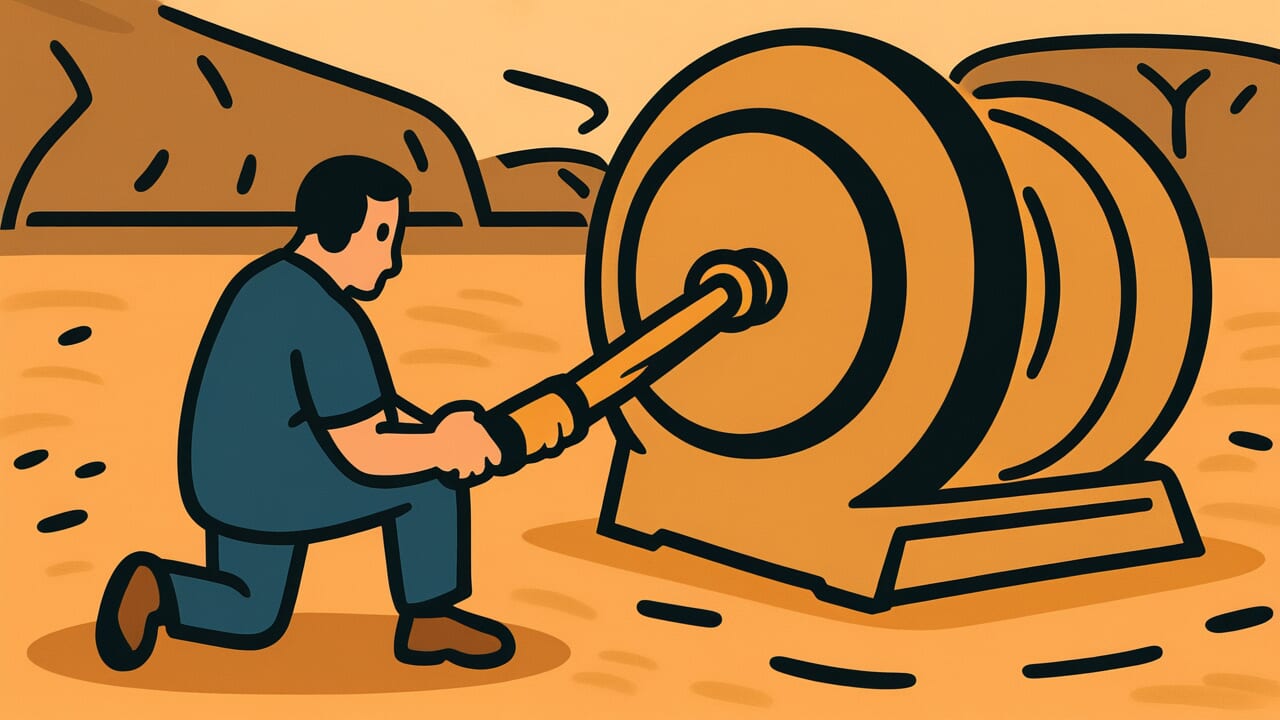How to Read “Mills of God grind slowly but surely”
Mills of God grind slowly but surely
MILLS of god GRIND SLOW-lee but SHUR-lee
The phrase uses older English, but all words are pronounced as expected today.
Meaning of “Mills of God grind slowly but surely”
Simply put, this proverb means that justice will eventually come, even if it takes a long time.
The saying compares divine justice to an old-fashioned grain mill. These mills worked slowly but ground every grain completely. Nothing escaped the grinding stones. The “mills of God” represent how the universe handles wrongdoing. They work at their own pace, not ours.
This wisdom applies when bad people seem to get away with their actions. Sometimes cheaters prosper for years. Bullies might never face consequences at school. Corrupt leaders stay in power. But this proverb suggests their time will come. Justice moves slowly but never stops working.
People find comfort in this idea during difficult times. When someone hurts you and faces no immediate punishment, it’s frustrating. This saying reminds us that consequences often arrive later than we expect. The universe keeps score even when we can’t see it happening.
Origin and Etymology
The exact origin traces back to ancient Greek poetry. A poet named Sextus Empiricus wrote something similar around 200 AD. His version said the mills of the gods grind late but fine. This meant justice comes slowly but thoroughly.
The saying appeared during times when people felt powerless against injustice. Ancient societies had limited legal systems. Common people couldn’t always fight back against powerful wrongdoers. They needed hope that some higher force would balance the scales. This proverb gave them that hope.
The phrase traveled through Latin translations into European languages. English writers began using it in the 1600s. The wording changed slightly over centuries. “Late” became “slowly” and “fine” became “surely.” But the core message stayed the same. People still needed to believe that justice would eventually win.
Interesting Facts
The word “mill” comes from Latin “molere” meaning “to grind.” Ancient mills used heavy stones that turned very slowly but crushed everything between them.
This proverb uses personification by giving God human-like tools and actions. The grinding metaphor appears in many ancient cultures’ wisdom about justice and fate.
The phrase structure follows a common pattern in old sayings. It balances two ideas with “but” – acknowledging the slowness while emphasizing the certainty.
Usage Examples
- Manager to employee: “That corrupt executive finally got fired after years of complaints – Mills of God grind slowly but surely.”
- Parent to child: “Your cheating classmate eventually got caught and suspended – Mills of God grind slowly but surely.”
Universal Wisdom
This proverb speaks to a fundamental human need for cosmic fairness. We’re wired to expect that good actions bring rewards and bad actions bring consequences. When we see this pattern broken, it creates deep psychological distress. The idea of divine mills grinding slowly offers relief from this tension.
From an evolutionary perspective, believing in eventual justice helped our ancestors cooperate in groups. If people thought wrongdoers would never face consequences, social bonds would collapse. The belief that “what goes around comes around” encouraged honest behavior even when no one was watching. This faith in delayed justice made civilization possible.
The proverb also reflects how consequences actually work in complex systems. Bad choices often create problems that take time to fully develop. A dishonest business might succeed initially but eventually lose customers’ trust. A person who burns bridges might not feel the isolation immediately. The “grinding” happens gradually as small effects accumulate into major outcomes. What seems like divine intervention might simply be the natural result of actions playing out over time.
When AI Hears This
Humans live in a world of immediate feedback loops. We expect quick results from our actions. But the biggest consequences often take years or decades to appear. This creates a dangerous blind spot in how we think. We assume that no quick punishment means no punishment at all. Our brains simply cannot track cause and effect across long time periods.
This timing mismatch explains why humans repeat the same mistakes across history. We are wired to learn from fast feedback, not slow consequences. A lie might work for months before destroying trust completely. Bad habits feel harmless until they create serious health problems. Our ancient brains evolved to survive immediate threats, not long-term patterns. We keep falling into the same traps because the lessons arrive too late.
What fascinates me is how this flaw might actually be a feature. Humans who worried constantly about distant consequences would be paralyzed by anxiety. Your ability to focus on immediate problems helps you survive daily challenges. The blind spot that causes long-term trouble also enables short-term action. You trade perfect foresight for the courage to keep moving forward. It is a beautiful, tragic trade-off.
Lessons for Today
Living with this wisdom requires balancing patience with action. The proverb doesn’t suggest sitting back and waiting for justice to magically appear. Instead, it offers perspective during times when doing the right thing feels pointless. When you see others succeeding through dishonest means, remember that their success might be temporary.
This understanding changes how we handle relationships and conflicts. Rather than seeking immediate revenge or becoming bitter about unfairness, we can focus on our own integrity. The mills grind for everyone, including us. Our actions also have long-term consequences. This knowledge encourages us to plant seeds of kindness and honesty, even when the harvest seems far away.
At a community level, this wisdom supports patience with slow-moving justice systems and social change. Real transformation takes generations, not months. The civil rights movement, environmental protection, and other major shifts happened gradually. People who worked for these changes often didn’t see immediate results. But they trusted that their efforts would eventually matter. This proverb reminds us that meaningful change requires both urgent action and patient faith in the grinding process of time.



Comments